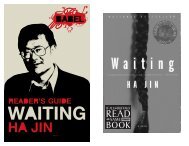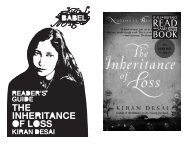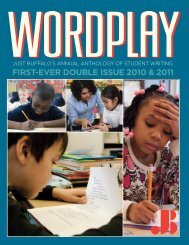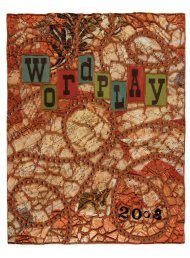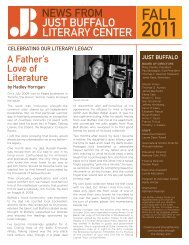Naomi Shihab Nye - Just Buffalo Literary Center
Naomi Shihab Nye - Just Buffalo Literary Center
Naomi Shihab Nye - Just Buffalo Literary Center
- No tags were found...
Create successful ePaper yourself
Turn your PDF publications into a flip-book with our unique Google optimized e-Paper software.
Readers Questions1. Does the title “Transfer” have one meaning, or many?How does it (or how do they) help define what <strong>Naomi</strong><strong>Shihab</strong> <strong>Nye</strong> is exploring in these poems?2. <strong>Naomi</strong> <strong>Shihab</strong> <strong>Nye</strong> tells students who are skepticalabout poetry: “Do you think in complete, elaboratesentences? In fully developed paragraphs withcareful footnotes? Or in flashes and bursts of images,snatches of lines leaping one to the next, descriptivefragments, sensory details? We think in poetry.” Doyou agree? How do the poems in Transfer illustratethis claim?3. How is <strong>Nye</strong>’s poetry different from her father’s? Howis it similar? Give some examples.4. Do you think the collection is more powerful andcoherent with the inclusion of Aziz’s poetry? Why orwhy not?5. What is missing from Aziz’s life that makes him sohomesick? Why does <strong>Nye</strong> describe him as a “refugee/not always”? When is he, and when isn’t he a refugee?6. A recurring theme in Transfer is the shifting placecalled “home,” and how traveling affects one’sdefinition of home. What does “home” mean in<strong>Nye</strong>’s poems as well as in her father’s? Find specificexamples.7. How does <strong>Nye</strong> incorporate and connect currentevents with history in her poetry? How does thisechoing of her late father’s profession in journalismimpact her poems?8. Identify some of the commonplace objects (i.e.stones, cucumbers, fig leaves, lentil soup, etc.) that<strong>Nye</strong> mentions. What do they signify in terms ofher memories of her father? Of her relationship toher surroundings? Why are these seemingly smallphysical objects so important to her?9. What role does food play in both <strong>Nye</strong>’s poems andher father’s? Find some examples.10. Throughout Transfer, <strong>Nye</strong> refers to “dialogue”—between her and her father in her memories of whenhe was alive, and in terms of her own identity as apoet and a teacher. Find some poems that illustratethis. How do you understand the lines: “we droppedour troubles / into the lap of the storyteller / and theyturned into someone else’s”?11. In Aziz’s poems, what is his attitude toward Palestineas an adult living in the United States? How does hefeel about Israel’s invasion of his people’s traditionalhomeland?12. How does Aziz cope with his loneliness anddisconnection as a refugee?13. How would you answer his question in “EverythingIn Our World Did Not Seem To Fit”: “Why wassomeone else’s need for a home / greater than our ownneed for our own homes”? To what is he referring?14. Go back and reread the poem, “Fifty Years Since IPrayed Or Thought In Arabic.” What importancedoes Aziz give to journalism, to reporting news, andto language itself? What made his professional work“magical” to him, and how might that magic beimportant to Palestinians as a whole? Find exampleswhere <strong>Nye</strong> describes the magic and power of words.15. What effect does war in the Middle East have onAziz and <strong>Nye</strong> throughout their lives? Give specificexamples in these poems.16. Both Aziz and <strong>Nye</strong> write about memory—distinctrecollections and flashbacks of conversations, people,objects and places. Give some examples and explainhow each poem succeeds in illustrating that specificmemory. Is it through emotion or detail, or both?17. What are some memories both daughter and fatherare fearful of losing, and others they know they havealready lost?18. What is hopeful about the poetry in Transfer?6



